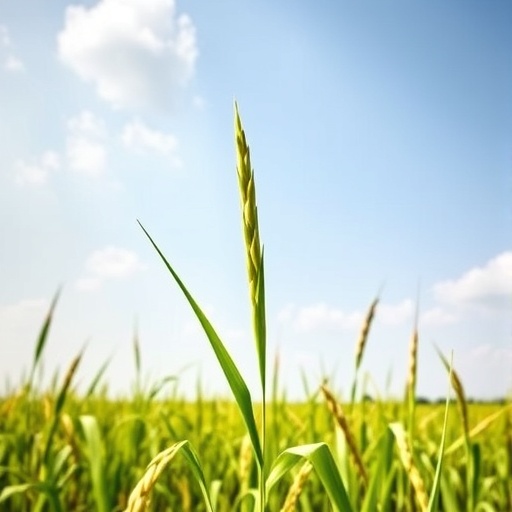In a groundbreaking study published in Discover Agriculture, researcher R.M. Emon sheds light on the transformative role of molecular markers and marker-assisted selection (MAS) in enhancing rice production to combat both biotic and abiotic stresses. As the global population surges, the demand for resilient crop varieties has never been more crucial. Rice, a staple food for over half of the world’s population, is increasingly threatened by pests, diseases, and changing climate conditions. This research represents a pivotal step toward ensuring food security in the face of these mounting challenges.
Molecular markers serve as crucial indicators in the genetic analysis of rice. They are segments of DNA that can be identified and used to locate specific genes associated with desirable traits. This study emphasizes the significance of utilizing molecular markers to identify and select rice varieties that possess high levels of resistance to various stresses, including fungal infections, insect infestations, and extreme climate conditions. The integration of molecular markers into traditional breeding practices promises a new era of precision agriculture, where crop improvement is driven by reliable genetic information.
One of the primary advantages of using markers in rice breeding is the potential for faster and more efficient selection of desirable traits. Traditional breeding methods can be time-consuming and labor-intensive, often requiring multiple generations to assess the phenotypic expression of traits. In contrast, molecular markers enable breeders to make informed decisions at early developmental stages, thereby significantly reducing the time needed to develop new rice varieties. This acceleration in varietal development is essential for meeting the increasing global food demand.
Emon explains that MAS not only enhances the efficiency of rice breeding but also provides a solution to challenges posed by climate change. Varieties that are resilient to drought, salinity, and temperature fluctuations are vital for sustaining production in regions where these stresses are prevalent. By identifying the genetic basis for these resilient traits through molecular markers, breeders can cultivate rice varieties that are well-adapted to their environments. This targeted approach offers a pathway to mitigate the impacts of climate change on rice cultivation.
The implications of integrating molecular markers into breeding programs extend well beyond environmental sustainability. Enhanced disease resistance is also a critical focus area. Rice crops are susceptible to a variety of pathogens, including bacteria, fungi, and viruses, which can devastate yields. The research conducted by Emon highlights how molecular markers allow breeders to track genes associated with resistance to these pathogens, facilitating the development of rice varieties that can withstand disease pressure. This not only improves yield stability but also reduces the reliance on chemical pesticides, further promoting sustainable agriculture.
As rice breeding continues to evolve, the combination of genomics and biotechnology is opening new frontiers. Innovations such as genome editing techniques, including CRISPR-Cas9, complement the use of molecular markers. These cutting-edge technologies enable precise modifications to the rice genome, allowing for the introduction of specific traits with a level of accuracy previously unattainable. Emon’s findings suggest that integrating these advanced methodologies with traditional breeding approaches creates a synergistic effect, maximizing the potential for developing resilient rice varieties.
Moreover, the research underscores the importance of collaborative efforts in plant breeding. The complexity of rice genetics necessitates a multidisciplinary approach that brings together geneticists, agronomists, and environmental scientists. Collaborative platforms can facilitate the sharing of knowledge, resources, and germplasm, ultimately leading to the accelerated development of new rice varieties. Emon advocates for partnerships among research institutions, universities, and private sector stakeholders to harness collective expertise in addressing the challenges faced by rice production.
The accessibility of molecular markers for rice breeding is another critical aspect highlighted in the study. Advances in technology have led to the commercialization of various molecular marker technologies, making them more accessible to plant breeders worldwide. This democratization of breeding tools ensures that resource-limited farmers also have the opportunity to benefit from the advancements in agricultural science. By equipping local breeders with the necessary tools, we can empower communities to develop rice varieties that cater specifically to their needs, fostering resilience at the grassroots level.
In light of the current challenges posed by global food security, Emon’s research represents a beacon of hope for the future of rice breeding. The integration of molecular markers into breeding programs is a step toward creating a sustainable food system capable of withstanding the pressures of climate change and increasing pest populations. However, for these advancements to translate into tangible outcomes, ongoing investment in research and development is crucial. Governments and international organizations must prioritize funding for agricultural research initiatives that focus on developing innovative solutions for crop improvement.
Ultimately, Emon’s study sheds light on the crucial intersection of science and agriculture, emphasizing that modern breeding practices must evolve to address the complexities of global food production. With molecular markers and marker-assisted selection paving the way for new advancements, the future of rice cultivation looks promising. As researchers continue to unravel the genetic intricacies of this vital crop, the potential to create resilient varieties that can thrive in ever-changing environments will be pivotal in ensuring food security for generations to come.
In conclusion, the advancements in molecular markers and marker-assisted selection present unprecedented opportunities for enhancing rice resilience against biotic and abiotic stresses. As R.M. Emon’s study highlights, these innovations are not just about increasing yields; they represent a comprehensive strategy for sustainable agriculture. As the global community continues to grapple with the challenges of climate change and food production, the insights gained from this research will be essential in guiding future breeding efforts, ultimately contributing to a more secure and sustainable global food system.
Subject of Research: Molecular markers and marker-assisted selection in rice cultivation.
Article Title: Molecular markers, marker assisted selection for rice in relation to biotic and abiotic stress.
Article References:
Emon, R.M. Molecular markers, marker assisted selection for rice in relation to biotic and abiotic stress. Discov Agric 3, 102 (2025). https://doi.org/10.1007/s44279-025-00265-w
Image Credits: AI Generated
DOI: 10.1007/s44279-025-00265-w
Keywords: Molecular markers, marker-assisted selection, rice breeding, biotic stress, abiotic stress, sustainable agriculture.




